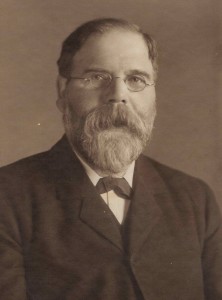A very special ordinary phonograph
Joseph Wright (1855-1930) was one of the most extraordinary people ever to rise to eminence in the academic world. For he was born in utter poverty, worked from the age of 6 (as a donkey boy in a stone quarry), and remained illiterate until he taught himself to read and write as a teenager. His thirst for education and love of language drove him forward; he studied at the university of Heidelberg, supporting himself as a mathematics teacher; but it was his genius for languages that got him noticed.
In 1891 he was invited to be Deputy Professor of Comparative Philology at Oxford, and succeeded as Professor in 1901. The achievement for which he is best remembered is the English Dialect Dictionary, a monumental six-volume compilation of regional words and expressions, published between 1896 and 1905. The project had been commenced under the medieval philologist Walter W. Skeat, but had proved prohibitively large and ambitious. Wright was undaunted by it, and when the University Press refused to subsidise it he paid for it to be printed from his own pocket, supplemented by a small number of subscriptions.
Yorkshire dialect was his true native speech, and for all his great learning he enjoyed speaking it not, as educated people often do, from amusement but because he believed passionately that dialects were respectable languages in their own right. He proved it by writing a learned phonetic grammar of West Yorkshire dialect, which his colleagues at first thought was a practical joke. He also published grammars of German, Old English, Gothic, and Greek. These have perhaps been superseded, but the English Dialect Dictionary is still, a century later, an essential and greatly respected reference book for scholars of language, folklore, and English social history.
In addition to the usual lexicographer’s procedure of writing words and their details on to slips of paper (estimated at two million), Wright employed the most advanced technique available at the time – the phonograph. The early cylinder machines recorded as well as playing back, and the 12 wax cylinders accompanying Wright’s phonograph contain field recordings of English and Scottish dialect made by Wright and Sir William Craigie in 1900 and 1902. They are among the earliest recordings made of the voices of ordinary human beings.
The phonograph and the blank cylinders were purchased from James Russell & Co., the Oxford music shop (precursor of Russell Acott, which closed down this year after 200 years). They were given to the Museum in 1937 in memory of Wright by his widow Mrs Elizabeth Wright, who had heard that the Museum – which had recently acquired an original Edison prototype – was searching for an ordinary Edison-Bell cylinder phonograph to complete its display. In one sense it is – it is the ordinary standard Edison-Bell model of about 1900; but museum exhibits are not just what they are, they are what they have become through their association and history – and in that sense Joseph Wright’s phonograph is no ordinary phonograph at all.
AVS
Associated objects:
